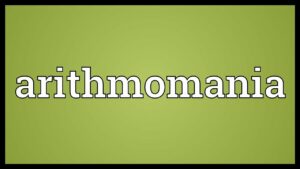oneAre you or someone you know struggling with the compulsion to continuously count numbers? If yes, then you may be dealing with arithmomania. This rare mental disorder can be disruptive and exhausting, but there is hope for recovery. In this blog post, we’ll explore various treatment methods for arithmomania so that those affected can receive the help they need to manage their symptoms and improve their quality of life. Let’s dive in!
Contents
What is Arithmomania?

Arithmomania is a mental disorder that is characterized by an obsession with numbers and an intense need to perform mathematical calculations. People with this condition often feel compelled to complete complex mathematical equations in their heads or on paper, and they may spend hours obsessively working on math problems.
The signs of arithmomania can be difficult to identify, but some of the most common symptoms include: spending long amounts of time on math-related activities, becoming easily frustrated when working on equations, having difficulty concentrating on other tasks that are unrelated to math, avoiding social situations because of embarrassment associated with their math obsession, and experiencing feelings of anxiety or stress when not working on equations.
The origin of arithmomania is unknown, but it has been linked to several psychological and neurological conditions such as obsessive-compulsive disorder (OCD) and Tourette syndrome. It is also possible that genetics or environmental factors could be contributing factors.
Treatment Methods for Arithmomania

Treating arithmomania is a complex and multifaceted process. It’s important to create a customized plan that works for the individual, as each person’s experience with arithmetic obsession differs in both intensity and form.
Some of the treatment methods are:
Medications
One of the main treatments for arithmomania is through medications. Antidepressants, such as selective serotonin reuptake inhibitors (SSRIs) and mood stabilizers, are commonly prescribed to help decrease the symptoms of OCD and related disorders, including arithmomania.
- SSRIs: One of the most common treatments for OCD, SSRIs are antidepressant medications that work by increasing levels of serotonin in the brain. They can help to reduce symptoms like intrusive thoughts and compulsive behavior.
- Mood Stabilizers: These drugs are used to treat bipolar disorder, but they may also help manage arithmomania. Mood stabilizers regulate the chemicals in your brain that affect mood and behavior.
- SNRIs: An SNRI is a type of antidepressant medication that works by increasing levels of serotonin and norepinephrine in the brain. This can help to reduce symptoms like obsessive thoughts and compulsive behaviors related to arithmomania.
Psychotherapy

Another treatment method for arithmomania is psychotherapy. Therapy helps to focus on how to control the thoughts and behaviors associated with arithmomania, while also helping people learn how to cope with any underlying emotional issues that may be contributing to the condition. In psychodynamic therapy, a therapist will work with an individual to help them better understand why they engage in compulsive behavior, such as calculating or counting numbers.
Some types of therapy are:
Cognitive-Behavioral Therapy (CBT)
CBT is a type of psychotherapy that helps people recognize and change any negative thought patterns that may be causing their compulsive behavior. It also helps them to manage stress, anxiety, and other contributing factors. This helps to reduce the pressure to compulsively calculate or count numbers.
Interpersonal Therapy (IPT)
IPT helps an individual understand their social and interpersonal relationships, which may be contributing to their arithmomania. A therapist can help people manage any conflicts or issues in these relationships, and teach them how to better communicate with others. It also helps people learn how to better recognize and manage their emotions.
Family-Based Therapy
This type of therapy involves the family and focuses on any interpersonal issues that may contribute to arithmomania or make it worse. A therapist can help family members understand the condition, and work with them to create a supportive environment for the individual. It helps to identify any unhelpful patterns of behavior and work on strategies to improve communication and relationships within the family.
Dialectical Behavioral Therapy (DBT)
DBT combines cognitive-behavioral techniques with mindfulness exercises to help people become more aware of their thoughts, feelings, and behaviors. It helps to build skills for managing emotions and stress, as well as recognizing when to take a break from compulsive behavior.
These types of therapy can help people gain insight into their condition and develop strategies for managing it. With the right support and guidance, people can learn how to control their arithmomania and live a healthier and happier life.
Support Groups

One type of treatment that can be extremely helpful for arithmomania is support groups. This provides sufferers with a chance to share their experiences and learn from others who are going through the same thing. It can be a great way to get moral support and practical advice.
There are many different types of support groups available, both in person and online to meet the individual needs of different arithmomaniacs. For example, some groups may focus on specific issues such as problem-solving or money management while others offer general emotional support.
Self-Care
An important part of any arithmomania treatment plan is self-care. This includes taking care of your physical and mental health. Exercise, getting enough sleep, eating a healthy diet, and engaging in relaxation techniques such as yoga and meditation can all help reduce the symptoms of arithmomania.
Some of these methods may seem simple, but they can have a profound effect on your ability to manage the condition. Taking time for yourself and engaging in activities that you enjoy can also provide some much-needed stress relief.
Additionally, it is important to set boundaries around your behavior. This means recognizing when it is time to take a break and not engaging in compulsive counting or calculating. It can also mean limiting exposure to certain triggers, such as news or financial reports that may cause anxiety.
Which Method To Select?
There are many different treatment methods for arithmomania and it can be difficult to choose the right one for you. The most important thing is to find a method that works best for your individual needs.
Some of the factors that one should consider when choosing the right treatment for arithmomania are:
- The severity of your symptoms: Sometimes, mild cases of arithmomania can be managed with lifestyle changes such as reducing stress, eliminating triggers, and engaging in calming activities. However, more severe cases may require professional treatment such as cognitive behavioral therapy or medication.
- Your preferences: Different treatments will work better for different people depending on their preferences and personality. Talk to your doctor about the various treatment options available and which one might be best for you.
- The resources available to you: Treatment for arithmomania can range from free self-help materials to expensive professional services. Consider your financial resources and what would be most feasible for you before deciding on a particular method.
No matter which routes you choose, it’s important to remember that you can make a difference in your life if you take the time and effort to seek help.
What If It’s Left Untreated?

When arithmomania is left untreated, it can have serious consequences. People who suffer from this disorder may never reach their full potential in life due to the time and energy they spend on several related activities.
They may be unable to focus on studies or work tasks and could struggle with interpersonal relationships because of an inability to take part in normal conversations without referencing numbers.
People with arithmomania may also have trouble sleeping and experience fatigue from overworking their brains. In extreme cases, this disorder can lead to physical health problems, depression, and even suicidal thoughts.
The impacts of untreated arithmomania can be far-reaching, making it important to seek professional help as soon as possible. Treatment options are available and can help those who suffer from this disorder lead happier and more fulfilling lives.
Conclusion
Arithmomania is a disorder that can be overwhelming and difficult to manage, but with the right treatment methods, it doesn’t have to define one’s life. Treatment for arithmomania should begin with cognitive behavioral therapy, which helps the individual identify the thoughts and behaviors associated with the condition.
Other helpful treatments include lifestyle changes such as increasing physical activity, getting enough sleep each night, reducing stress levels, and avoiding substances like alcohol or caffeine. With diligence and perseverance in using these treatments regularly, individuals suffering from arithmomania will be able to lead healthier lives free of obsessions over numbers or counting rituals.
For more information and guidance, please contact MantraCare. OCD is a mental health disorder characterized by obsessions and compulsions. If you have any queries regarding Online OCD Counseling experienced therapists at MantraCare can help: Book a trial OCD therapy session

